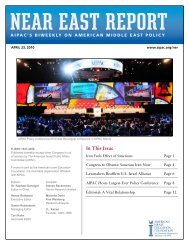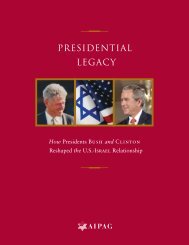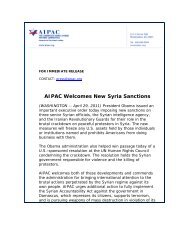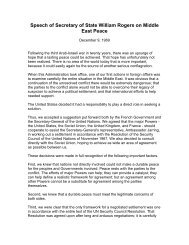2013 Briefing Book - Print Version - Aipac
2013 Briefing Book - Print Version - Aipac
2013 Briefing Book - Print Version - Aipac
You also want an ePaper? Increase the reach of your titles
YUMPU automatically turns print PDFs into web optimized ePapers that Google loves.
ISRAEL AT RISK<br />
A Region in Flux<br />
The “Arab Spring” has brought tectonic change to the Middle East, and has the potential to rewrite the<br />
political order that has dominated the region for decades. With the rise of an Islamist regime in Egypt, the<br />
lawlessness of Sinai, the deterioration of the Assad regime in Syria, the triumph of Hizballah in Lebanon<br />
and uncertainty in Jordan, Israel can no longer rely on stability and predictability among its immediate<br />
neighbors. Regional Arab powers such as Qatar, Saudi Arabia, and the United Arab Emirates are also<br />
facing internal challenges that threaten regional stability. Beyond the Arab world, once strong Israeli-<br />
Turkish relations have frayed as Turkish Prime Minister Recep Tayyip Erdoğan of the Islamist Justice and<br />
Development Party has sought to distance Turkey from the Jewish state.<br />
Israeli-Egyptian Peace Treaty Key to Regional Stability<br />
With the downfall of Hosni Mubarak, the future of Egytian-Israeli peaceful relations has been<br />
called into question. In 1979, Egypt became the first Arab country to sign a peace treaty with<br />
Israel, removing the threat of attack by the Arab world’s most populous and powerful country.<br />
Although the peace had been cold, Cairo adhered to its main treaty commitments: full diplomatic<br />
relations; keeping the Sinai as a demilitarized buffer zone; permitting the presence in the Sinai of<br />
the U.S.-led Multinational Force and Observers; and maintaining freedom of navigation through<br />
the Suez Canal even for Israeli warships.<br />
Turmoil in Egypt has raised questions about Cairo’s<br />
commitment to its peace treaty with Israel.<br />
Importantly, since the signing of the U.S.-<br />
brokered peace treaty with Israel, Egypt<br />
has been the key U.S. strategic ally in the<br />
Arab world. Egypt worked with the United<br />
States in opposing Islamic radicalism in its<br />
many forms (Hamas in Gaza, al-Qaeda in<br />
the entire region, Hizballah in Lebanon)<br />
and had been a strong opponent of Iran’s<br />
nuclear program and efforts to attain<br />
regional hegemony. Egyptian troops even<br />
participated alongside U.S. forces in the<br />
liberation of Kuwait during the first Gulf<br />
War in 1991. In return, Egypt benefited<br />
from massive annual U.S. military and<br />
economic assistance.<br />
88








